Best Dog Food For Skin Allergies

DogFoodAdvisor is reader supported See how
All reviews are 100% impartial but if you buy using links on this page, we may earn a referral fee.
What’s the best dog food for skin allergies?
Dogs can suffer from skin allergies just like us, and these can be caused by three factors — environmental, food, and fleas.
Skin allergies can be extremely unpleasant, causing itchy skin, hives, swelling, loss of fur, and red, irritated skin.
They can be triggered by a range of ingredients in your dog’s food such as:
- Chicken
- Peas
- Beef
- Wheat
- Dairy
- Plant based or insect proteins
- Omega 3 sources
The best way to prevent an allergic reaction from your dog’s food is to analyze the label for the above ingredients — or any other ingredients which you think may be causing a reaction.
You can then choose a dog food which is formulated for skin allergies, but each dog and allergy is different, so it is important to consult your veterinarian first to determine what may be causing your dog’s skin allergy, and therefore which ingredients to avoid. A veterinarian can also help you with treatment for any allergic reactions and symptoms.
In the meantime, we have compiled a list of the best foods for dogs with skin allergies.
Top Picks For Dogs With Skin Allergies
On the list below…
You’ll find The Dog Food Advisor’s best dog and puppy foods for skin allergies
You’ll also learn the answer to each of the most frequently asked questions we get about dogs with skin allergies

Best Dog Food For Skin Allergies April 2024
Here are The Dog Food Advisor's best dog food brands for skin allergies for April 2024.
-
1. The Farmer's Dog
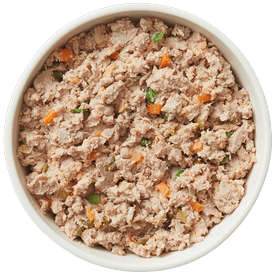
Pork is one of 4 recipes included in our review of the The Farmer’s Dog product line.
The Farmer’s Dog Pork Recipe derives the bulk of its meat protein from pork. Dry matter label analysis reveals the recipe contains 36% protein, 28% fat and 28% estimated carbs… resulting in a fat-to-protein ratio of about 78%.
Read our review of the full The Farmer’s Dog Food (Fresh) range here
Main Ingredients Pork, sweet potatoes, potato, green beans, cauliflower Type Grain-free, fresh Protein Percentage 36 AAFCO Standards All Life Stages Best For Puppies and dogs Sample buyer review...
Read more buyer reviews at TheFarmersDog.com"The Farmer's Dog has cleared up all of my dogs allergies and Pip just absolutely loves his fresh food!"
-
2. NomNom
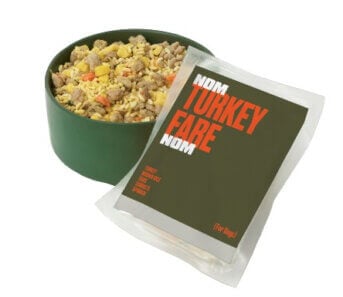
Turkey Fare is one of 4 recipes included in our review of the Nom Nom Fresh product line.
Nom Nom Turkey Fare derives the bulk of its meat protein from turkey. Dry matter label analysis reveals the recipe contains 35.7% protein, 17.9% fat and 38.4% estimated carbs… resulting in a fat-to-protein ratio of about 50%.
Read our review of the full 4Health Dog Food (Canned) range here
Main Ingredients Ground turkey, brown rice, eggs, carrots, spinach Type Grain-free, fresh Protein Percentage 35.7 AAFCO Standards All Life Stages Best For Puppies and dogs Sample buyer review...
Read more buyer reviews at NomNomNow"Tula gets so excited when it's mealtime. She no longer has skin issues, her coat looks wonderful and her stools are the best they've ever been. I can't imagine ever feeding her anything but Nom Nom!"
-
3. Merrick
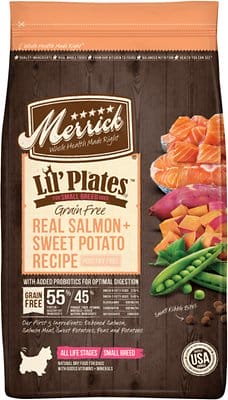
Salmon & Sweet Potato Recipe is one of 12 recipes included in our review of the Merrick Grain-Free product line.
Merrick Grain-Free Real Salmon & Sweet Potato derives the bulk of its protein from salmon. Dry matter label analysis reveals the recipe contains 33.7% protein, 16.9% fat and 41.4% estimated carbs… resulting in a fat-to-protein ratio of about 50%.
Read our review of the full Merrick Grain Free Dog Food (Dry) range here
Main Ingredients Deboned salmon, salmon meal, whitefish meal, sweet potatoes, potatoes Type Grain-free Protein Percentage 33.7 AAFCO Standards Maintenance Best For Dogs Sample buyer review...
Read more buyer reviews at MerrickPetCare.com"One of the few brands and types that my dog can eat without an allergic reaction."
-
4. Wellness

Venison & Salmon Stew with Potato & Carrots is one of 6 recipes included in our review of the Wellness Stews product line.
Wellness Venison & Salmon Stew with Potato & Carrots Recipe derives the bulk of its meat protein from venison. Dry matter label analysis reveals the recipe contains 44.4% protein, 19.4% fat and 28.1% estimated carbs… resulting a fat-to-protein ratio of about 44%.
Read our review of the full Wellness Stews Dog Food (Canned) range here
Main Ingredients Venison broth, venison, beef liver, salmon, carrots Type Grain-free Protein Percentage 44.4 AAFCO Standards All Life Stages Best For Puppies and dogs Sample buyer review...
Read more buyer reviews at WellnessPetFood.com"My dog loves this stuff! She has a chicken allergy and finding dog food without it is hard. It is a little pricey but she is worth it!"
-
5. Hill's Science Diet
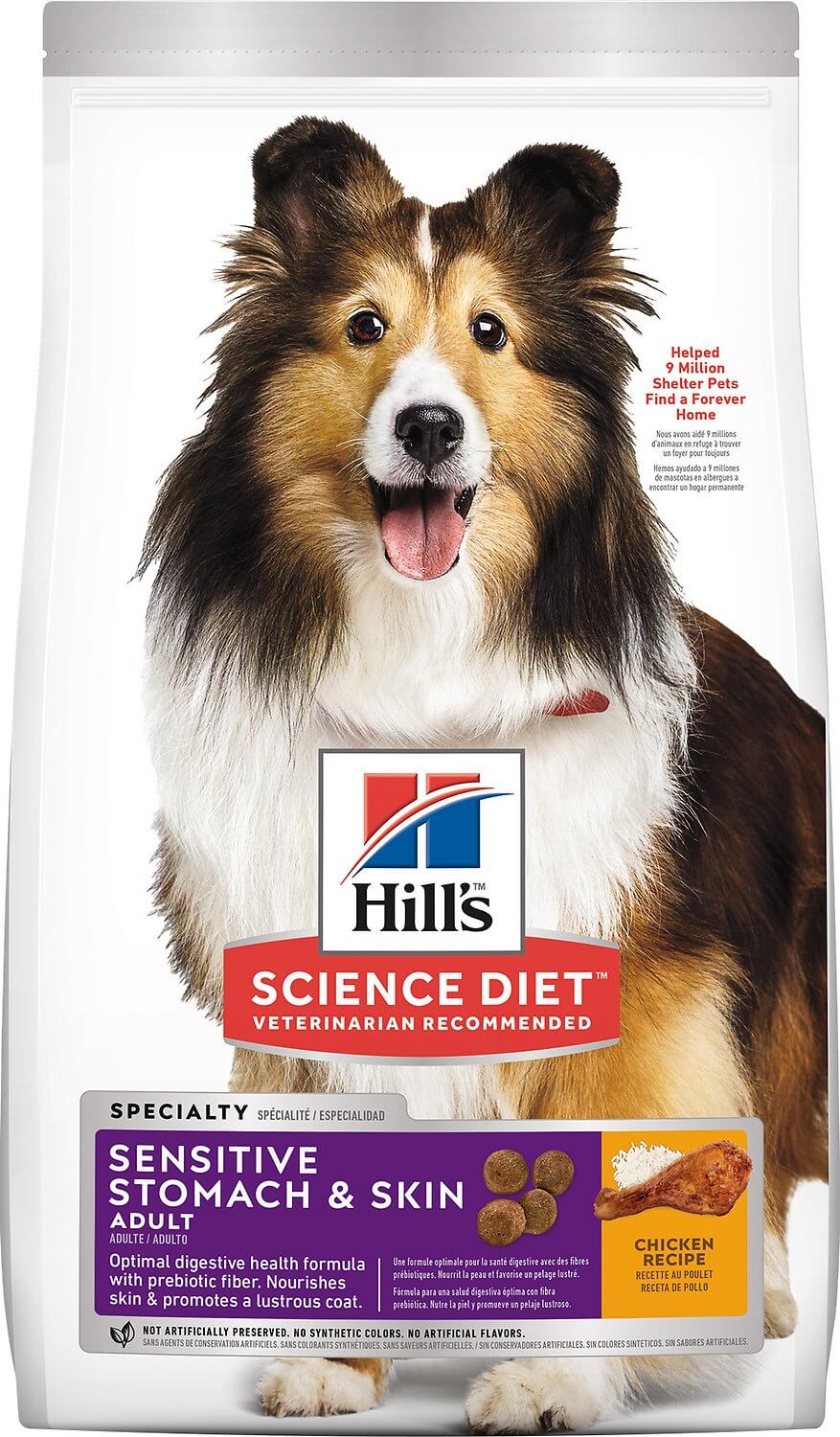
Chicken is one of 26 recipes included in our review of the Hill’s Science Diet product line.
Hill’s Science Diet Adult Sensitive stomach and Sensitive Skin Large Breed – Chicken Recipe derives the bulk of its meat protein from chicken. Dry matter label analysis reveals the recipe contains 22.2% protein, 14.4% fat and 55.3% estimated carbs… resulting in a fat-to-protein ratio of about 65%.
Read our review of the full Hill’s Science Diet Adult Dog Food (Dry) range here
Main Ingredients Chicken, chicken meal, yellow peas, cracked pearled barley, brown rice Type Grain-inclusive Protein Percentage 22.2 AAFCO Standards Maintenance Best For Dogs Sample buyer review...
Read more buyer reviews at HillsPet.com"This food has basically eliminated the excessive gas and inconsistent stools my dog had. It has also helped with chewing and scratching due to allergies."
-
6. Taste Of The Wild
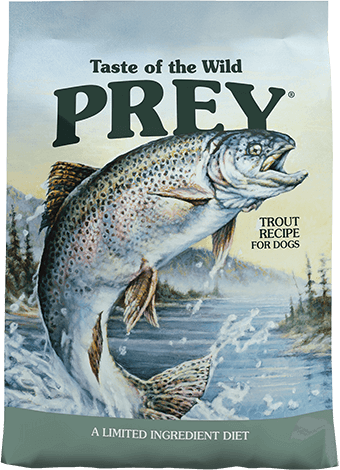
Trout is one of 3 recipes included in our review of the Taste of The Wild product line.
Taste Of The Wild – Trout Formula Limited Ingredient Recipe derives the bulk of its protein from trout. Dry matter label analysis reveals the recipe contains 30% protein, 16.7% fat and 45.3% estimated carbs… resulting in a fat-to-protein ratio of about 56%.
Read our review of the full Taste of the Wild Prey Dog Food (Dry) range here
Main Ingredients Trout, lentils, tomato pomace, chicken fat (preserved with mixed tocopherols), natural flavor Type Grain-free Protein Percentage 30 AAFCO Standards All Life Stages Best For Puppies and dogs Sample buyer review...
Read more buyer reviews at TasteOfTheWild.com"I have been feeding Taste of the Wild for many years and all my dogs have done well and love their kibble. Grain free, ancient grains, and the Prey. My two young Boys have issues with chicken and the Trout Prey formula is perfect. Very satisfied and a forever customer."
More Top Picks
To view more top dog foods by category… click the link below that best meets your personal feeding needs.
Frequently Asked Questions
What is the main cause of skin allergies in dogs?
There are three types of skin allergies in dogs:
- Environmental allergies — including pollen, dust, and mold
- Food allergies — caused by ingredients in food
- Flea allergies — also known as flea allergy dermatitis (FAD), caused by flea bites
Which dog breeds are more prone to skin allergies?
Certain dog breeds are more prone to skin allergies than others, including Dalmatians, Bulldogs, Golden Retrievers, Labradoodles, Beagles, English and Irish Setters, Goldendoodles, Labrador Retrievers, most terriers, Pugs, English Sheepdogs, Miniature Schnauzers, and Lhasa Apsos.
This list is not exhaustive and the breeds included are not guaranteed to develop skin allergies, it’s just a list of breeds which are often more likely to have atopic dermatitis.
What are the symptoms of skin allergies in dogs?
The main symptoms of skin allergies in dogs to look out for are:
- Excessive scratching
- Chewing or biting the skin
- Rubbing against furniture or floors (trying to scratch the itchy skin)
- Red, inflamed skin
- Hives
- Hair loss
- Dry, cracked, or scaly skin
How are skin allergies diagnosed in dogs?
Just like humans, allergy testing is not straight forward. It can take multiple methods and months of deductive tests to get to the root of the problem. The most common way of testing for an allergy is through blood or skin samples, but this might not always work or provide accurate results.
Seek advice from your veterinarian if you think your dog might be having an allergic reaction, as they can advise the best method for diagnosis and help you with a treatment plan.
How do you treat skin allergies in dogs?
Treatment for skin allergies in dogs depends on what is causing the reaction.
Environmental allergies – The first thing you could do to help soothe your dog’s skin is to give them a good brush and a bath. Brushing will help to remove any dandruff and allergens which may be attached to your dog’s fur. You should also avoid potential triggers such as pollen, but this might be difficult depending on the season and where you live. Your vet will help you to determine what is triggering your dog’s allergy and may prescribe antihistamines or an atopic cream.
Flea allergies – Immediate treatment for flea allergy dermatitis includes bathing your dog with a medicated shampoo. Using a preventative flea shampoo going forward can also avoid another flea infestation and allergic reaction. You should maintain a regular flea treatment schedule and also flea-treat your home.
Food allergies – Once your veterinarian has helped you to understand which ingredients are causing your dog’s allergies, you can avoid foods which contain them. Your vet could also help you to change food safely without sacrificing your dog’s nutritional needs.






